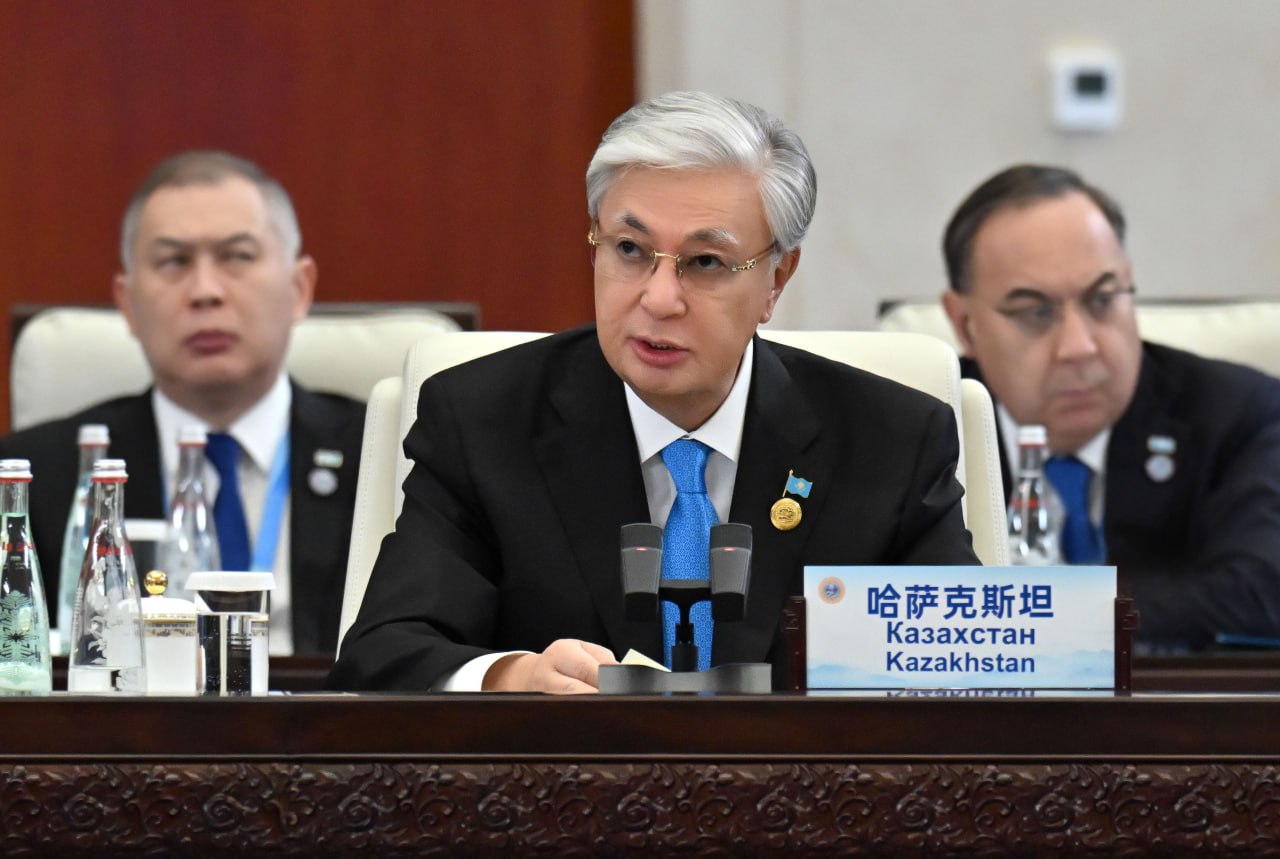BAKU, Azerbaijan, September 2. The Shanghai Cooperation Organization (SCO) summit in Tianjin has become a significant milestone in international politics. For Kazakhstan, this event carried special importance, as President Kassym-Jomart Tokayev not only participated in discussions but also presented concrete, well-thought-out proposals. His vision aims to make the SCO an even more effective and influential platform. These initiatives, rooted in strategic domestic reforms, are designed to strengthen regional cooperation in politics, economics, and environmental protection.
President Tokayev placed particular emphasis on reinforcing strategic partnerships and mutual support within the SCO. He stressed that in the context of escalating geopolitical conflicts and sanction pressures, the organization should serve as a “permanently functioning platform for broad political interaction, the strengthening of mutual trust in the international community, the development of humanitarian cooperation, and intercivilizational dialogue.” This vision aligns with the fundamental principles of the SCO, based on the “Shanghai Spirit” - mutual trust, mutual benefit, equality, consultation, respect for cultural diversity, and a commitment to joint development. Kazakhstan, as a member state, actively advocates adherence to these principles.
One of the key areas proposed by President Tokayev is enhanced cooperation in security. Given rising threats such as international terrorism, extremism, drug trafficking, and cybercrime, joint action is considered the only effective way to address them. Kazakhstan supported the initiative to establish four SCO centers dedicated to tackling these challenges. The importance of assisting Afghanistan in its recovery and integrating it into regional economic processes was also highlighted. Kazakhstan has already begun constructing infrastructure and logistics projects in Afghanistan, strengthening regional connectivity.
Tokayev also called for reforming the United Nations, noting the urgent need to reform its key body, the Security Council. This statement underscores Kazakhstan’s commitment to creating a fairer and more sustainable world order in which every country has a voice.
In the economic sphere, President Tokayev emphasized expanding trade, investment, and economic cooperation.
“Since the SCO’s establishment, our countries’ contribution to global GDP has doubled, reaching 30 percent. Intra-regional trade has also grown impressively, reaching over $650 billion in 2024. Kazakhstan’s trade turnover with SCO countries continues to rise steadily, approaching $70 billion last year. Kazakhstan supports China’s initiative to create an SCO Development Bank and is ready to participate in this promising project,” Tokayev noted.
In this context, the 8th Kazakhstan–China Business Council meeting was another key event, attended by President Tokayev and China’s First Vice Premier Ding Xuesong. Over 500 government and business representatives from both countries participated, including executives from more than 70 major Chinese corporations. According to the president, China has already invested $27 billion in Kazakhstan’s economy, and over 6,000 enterprises with Chinese capital, including CNPC, CITIC, SINOPEC, and HUAWEI, operate successfully in the country. More than 70 commercial agreements totaling over $15 billion were signed during the meeting.
At the summit, President Tokayev proposed several concrete steps for further development:
Support for the establishment of an SCO Development Bank, highlighting its potential as a financial institution for advancing member states’ economies.
Creating an SCO Office at the Astana International Financial Centre (AIFC) to facilitate investment projects and consolidate corporate activities.
Strengthening cooperation in transit and transport was a top priority. Tokayev highlighted the enormous potential of projects such as “One Belt, One Road,” the North–South and East–West transport corridors, and the Trans-Caspian International Transport Route. Kazakhstan currently handles 85 percent of all continental cargo transport between China and Europe, and the capacity of the Dostyk–Moyynty section will increase fivefold with the introduction of second tracks. Last year, 4.5 million tons of cargo were transported via the Trans-Caspian route (a 62 percent increase), and the goal is to raise this figure to 10 million tons in the near future.
Joint infrastructure projects, including the Kazakhstan–China logistics terminal in Lianyungang port, the dry port in Xi’an, and increased transit via Aktau and Kuryk ports, open new opportunities for businesses.
President Tokayev also stressed the urgent need to boost cooperation in high-tech sectors and digitalization. With the AI market projected to reach $5 trillion by 2033, he expressed confidence that the SCO could become a global leader in this area. Practical steps include establishing an SCO Expert Forum on Artificial Intelligence and hosting a high-level AI conference.
“The first such meeting is planned to take place in Astana on the sidelines of the prestigious Digital Bridge forum. Furthermore, in 2027, Kazakhstan plans to organize a High-Level Conference on ‘Artificial Intelligence for SCO Economies.’ Next year, media representatives from SCO countries will be invited to discuss issues in information policy in the new technological era,” Tokayev said.
Special attention was also given to energy and industrial projects with Chinese partners. In Atyrau, a Sinopec-led polyethylene plant with a capacity of 1.25 million tons per year and investments of $7.4 billion has begun construction. Plans are underway to modernize the Shymkent Refinery with CNPC participation, increasing its capacity to 12 million tons. Other key projects include renewable energy development with China Power International Holding and China Energy, a 160 MW combined-cycle plant in Mangystau with China Huadian Corporation, and a urea plant in Aktobe region.
Steps toward implementing Kazakhstan’s plans are already underway. During a meeting with CNPC Chairman Dai Houliang, the president emphasized the strategic nature of the partnership, thanked the company for its contributions to Kazakhstan’s energy sector, and confirmed readiness to implement new joint initiatives.
Equally important was the dialogue with the Asian Infrastructure Investment Bank (AIIB). During a meeting with its president Jin Liqun, prospects for cooperation in transport, energy, healthcare, and green technologies were discussed. Kazakhstan expressed readiness to serve as a regional platform for the Bank’s expanded activities. AIIB has already supported projects in Kazakhstan totaling over $2 billion, including a wind farm in Zhambyl region, the Zhezkazgan–Karaganda road, and a multi-specialty hospital in Kokshetau.
President Tokayev also addressed environmental issues. Kazakhstan proposed establishing an SCO Center for Water Studies, an important step in combating climate change. This proposal was supported by SCO member states, who also agreed to hold a Regional Climate Summit in Kazakhstan in 2026 under UN auspices.
“Climate challenges know no borders and affect many countries and regions worldwide. It is essential to jointly develop effective strategies to tackle real threats, such as desertification, droughts, water shortages, glacier melt, and other environmental problems. That is why we support the creation of an SCO Center for Water Studies in Kazakhstan,” Tokayev said.
President Tokayev’s proposals at the SCO summit reflect not only Kazakhstan’s ambitions but also its commitment to constructive and balanced cooperation. They aim to strengthen the SCO as a key player in global politics and economics while addressing common challenges faced by all member states. Initiatives in security, economy, and the environment demonstrate Kazakhstan’s readiness to lead in these areas.
As Tokayev himself noted, it is important to approach the SCO’s 25th anniversary thoughtfully and rationally to achieve meaningful, mature practical results for the peoples of the region. Kazakhstan’s participation in the summit demonstrates its proactive foreign policy, focused on partnership, stability, and sustainable development.







